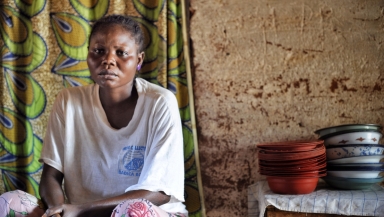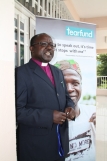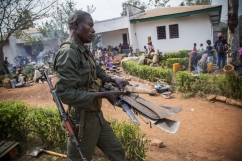
20-year-old Moses was crying as he tried to tell his story. He knew he was going to find it difficult so he had asked his pastor to pray for us first before our conversation.
We were in Uganda, where Moses had returned to his home village a year or so before, having spent the previous ten years as a child soldier.
He was abducted aged nine during the worst of the troubles in northern Uganda. He lived in constant fear as he was trained to raid villages and kill people.
His tears were for the shame and revulsion he felt as he remembered having to rape women and girls. "I had to conquer women who were like my mother," he said.
Despite being only a child with no understanding of sex of any kind - loving or otherwise - he knew that he had to rape women as he'd been instructed, because he would be killed if he didn't.
Life is cheap in many wars, and Moses had already seen many of his very young friends killed for not joining in the life of the corps - murdered for not being able to learn the local language of the army chief or for not gathering enough food to feed their fellow soldiers.
As for dignity, for many women, children and men all over the world, it's practically a forgotten concept; a luxury no-one can afford any more.
In Central African Republic women last month told me of being raped brutally at gunpoint. Their stories were distressing, and 28-year-old Leontine clung to my hand and wept as she heard the interpreter describe to me her account of three soldiers ripping her clothes off and taking it in turns to rape her in the arid heat of an open field. "They kept going until I lost consciousness," she said. "And when I woke up, I was bleeding. I bled so much and still I have pain there."
What is particularly chilling is the consistency of these narratives. In two days, five women - who didn't know each other and who lived in different parts of the city of Bangui - told me startlingly similar stories. Always two or more men per woman, always at gunpoint, always in the same position, always for a long time and causing similar injuries.
Tearfund has worked in many war zones and post-conflict areas over the years, finding that armed groups are using rape systematically to exert power and to cause extreme levels of fear and terror.
When rapes are reported independently using very similar descriptions, we know that it is a planned part of the military strategy. The nature of sexual violence varies from conflict to conflict - in some countries, armed groups use foreign objects or target very young children or men - but their consistency within each conflict is telling.
We hear from former soldiers that rewards and punishments are part of life in their armed groups. They are incentivised to rape through rewards systems - extra food, cigarettes, status in the group – and punished if they don't.
It's the same in many conflicts. Soldiers are rewarded for brutality, like in Syria where the Times reported last October that snipers were given extra cigarettes if they shot and hit a pregnant woman's belly.
Throughout history, especially in places where there is little regard for international protocols or the rules of war, the rape and murder of civilians has become the easiest way for communities to be dominated.
When people are raped, they go through the immense physical trauma of the event and of subsequent injuries. Many also live with the horrors of recurring nightmares, shame, fear of contact with anyone and, often, vilification and rejection from family and friends.
Systematic rape and killing often goes hand-in-hand with family breakdown, as parents flee to different places for refuge or one or both are killed, and children end up confused and far from home.
For those children, this topsy-turvy world has devastating consequences. They grow up with very little understanding of a stable loving family, and are often passed around from one home to the next before having to fend for themselves at a very young age without proper education or healthcare.
When I asked 17-year-old rape survivor Amelia in Central African Republic about her hopes for the future, she said: "I just want to go to school. I've missed a year because we had to run away to the city when I was raped, and now I don't go to school anymore." She loves to learn and she knows that education is her ticket to a better life, but she has been robbed of that.
The armed groups know this, and their strategies of systematic rape, killings and raids are intended to wreak as much havoc as possible, both immediately and for many years to come, because it takes a long time to recover.
It's often a hallmark of post-conflict states that governance is extremely difficult because the people who survived the war have never known anything but fighting, so they haven't figured out ways to govern peacefully.
I met a village chief in Liberia a few years ago, who was in his thirties. In his part of the country, village chiefs had traditionally been much older than that, but he was the only person left after the carnage of the conflict who had returned to his home village and been willing to take on leadership.
He knew that many people looked to him for guidance, but all the disputes he had witnessed for many years previously had been resolved by fighting and sexual violence. He had a big task on his hands.
And that's why sexual violence is so fundamental to many conflicts. It's not random or opportunistic, and it's not about sexual gratification.
It's a sinister abuse of power, designed to kill people's spirits and ruin the fabric of families and communities. It changes the lives of individuals and communities forever, and takes those people years to recover.
It can become part of everyday life, even many years after the conflict itself is over. In Rwanda, 20 years after the genocide, pastors told me of the legacy of sexual violence. Even though the fighting had finished, there was still a strong culture of using rape to finish an argument or, in street robbery, to force a woman to hand over her possessions.
The Archbishop of Rwanda, the Most Rev Dr Onesphore Rwaje, told me that, even 20 years on, this is still a confusing situation for many people and that rape within families - of wives and daughters - had become more common since the conflict.
Our latest Tearfund research, funded by the UK's Foreign & Commonwealth Office, examines attitudes to masculinity and gender in the Great Lakes region of Africa. It's a largely Christian region and we found there, as in so many places, that churches are hugely influential in forming and changing attitudes and behaviour. Sexual violence quickly becomes normalised in cultures where women are considered inferior, or where sex is not always seen as a loving act between consenting adults.
Where churches are equipped to denounce openly and reject the normalisation of sexual and gender-based violence, we see stigma reduced and, in the long term, more stable families and reduced incidence of rape.
And in places like Rwanda, where pastors and churches are leading their communities to declare themselves 'rape-free villages', the army of local volunteers easily mobilised through the church quickly swing into action when someone is assaulted, taking them to the clinic for examination and accompanying them to report the crime to the Police and through the court proceedings.
The Ending Sexual Violence in Conflict summit in London this week, co-hosted by the UK's Foreign Secretary William Hague and actor Angelina Jolie, brings together 100 countries to agree how best to end rape in war.
If the conference is to be more than an expensive networking event, it must result in tough and effective judicial systems prosecuting those who rape or authorise sexual violence. In many countries, war is accompanied by lawlessness and often the national constitution becomes defunct, so it's vital that governments agree to national and international legal systems that act as sufficient deterrent.
And the aid budgets that fund humanitarian assistance must allocate funds to helping people who have been raped or forced to watch someone being raped. Emergency services funded in war zones - medical assistance, food distribution, latrine construction, water supply - should also be located and managed so that everyone can use them without fear of assault.
In the international community, sexual violence sometimes runs the risk of being seen as an add-on; something we'll get to if we can after we've finished meeting other needs. So this summit, and especially the huge focus on the role of churches and faith communities, is a big step forward in recognising the relentlessly evil abuse of power perpetrated every day.
It needs to be about more than awareness, though. The millions of survivors in war zones around the world deserve more than that.
Katie Harrison works for Tearfund.















